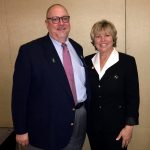N.J. Nurses Advocate For Gun Violence Study at Top Trauma Center
Congressman Pallone, Doctors Join NJSNA Call to Lift Ban on CDC Study

Congressman Frank Pallone (D-6) and New Jersey State Nurses Association President Norma Rodgers, BSN, RN, CCRA at Robert Wood Johnson University Hospital.
TRENTON, N.J.—Sept. 19, 2016—Physicians, along with Congressman Frank Pallone (D-6), joined the New Jersey State Nurses Association (NJSNA)’s clarion call to lift the federal ban that prevents the Centers for Disease Control and Prevention (CDC) from studying the impact of gun violence on healthcare.
“One thing we would like to see happen is the removal of language that bans the CDC from doing a study and research on how gun violence is a public health crisis and how it’s impacting the healthcare system,” said Norma Rodgers, BSN, RN, CCRA, NJSNA president. “As healthcare providers, we need data in order to help the communities we live in. We need that data to put programs in place to make sure people are healing as a whole—it’s not only the victim, it’s the family and the community they live in.”
Medical professionals from many areas of practice were in attendance as the Congressman listened to them discuss the need for scientific research into the impact of gun violence on healthcare at an event at Robert Wood Johnson University Hospital on Friday.
“I don’t know how many of you saw the Trenton Times from (Sept. 15), but six people got shot in 12 minutes in Trenton on (Sept. 13),” said Puthenmadam Radhakrishnan, MD, MPH, FAAP, a Trenton pediatrician and secretary of the American Academy of Pediatrics, New Jersey Chapter. “The way to get around a problem is to understand the problem. We pride ourselves as Americans that we really look into (a problem) and research it and educate ourselves and then come up with a solution. It’s not that we just find something happening and jump into it without understanding what the situation is. If we are going to handicap the CDC and tell them you can’t look into this and educate us about this and you can’t tell us what’s happening across the country, what good is it? We need to understand (gun violence) as a public health issue, not just an issue of violence. We need to deal with it as a community, as providers and as educators.”
A CDC study would pinpoint where the public health issues from gun violence truly are, Rodgers said. Initially, NJSNA officials met with federal legislators in Washington, D.C., in June to discuss the issue and then met with Rep. Pallone at his New Brunswick office to discuss the issue again.
“To put it in a public health context…no one addresses the war we have going on on our streets every day,” said Dr. Rajan Gupta, director of the Acute Care Surgery Fellowship Program and medical director of the Level 1 Trauma Center at Robert Wood Johnson University Hospital. “As a trauma center we have very little ability to do systems-based research and start looking at the distribution of trauma centers, the distribution of guns based on population density and so on…our ability to do this in a systematic and scientific way is extremely limited. Whatever bans we can lift and get some federal funding for this, perhaps, 25 years later we can have an impact.”
For more information about NJSNA visit www.njsna.org.
###
About NJSNA
NJSNA, which was established in 1901, is a constituent member of the American Nurses Association. The New Jersey State Nurses Association (NJSNA) represents the interests of 125,000 registered nurses and advanced practice nurses as an advocate for the nursing profession. NJSNA’s lobbying arm continues to protect the nursing profession through legislative victories. Its nonprofit foundation, Institute for Nursing, helps nurses further their careers by providing continuing education, scholarships and research grants in addition to invaluable networking opportunities. For more information, nurses can visit www.njsna.org or contact NJSNA at njsna@njsna.org or (609) 883-5335.




